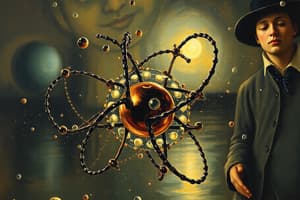Podcast
Questions and Answers
What is the smallest particle of an element that participates in chemical reactions?
What is the smallest particle of an element that participates in chemical reactions?
- Atoms (correct)
- Ions
- Molecules
- Compounds
How do atoms bond together to form structures like molecules?
How do atoms bond together to form structures like molecules?
- Through magnetic forces
- By absorbing protons
- By sharing electrons (correct)
- Through gravitational pull
Which tool do chemists rely on to understand the building blocks of matter?
Which tool do chemists rely on to understand the building blocks of matter?
- Beaker
- Spectrometer
- Periodic table (correct)
- Microscope
What do chemists use to predict the structure and properties of substances?
What do chemists use to predict the structure and properties of substances?
In which order are elements arranged in the periodic table?
In which order are elements arranged in the periodic table?
What happens during a chemical reaction?
What happens during a chemical reaction?
What is the process of breaking a complex substance into simpler substances called?
What is the process of breaking a complex substance into simpler substances called?
In which type of chemical reaction does oxygen react with a substance to produce energy?
In which type of chemical reaction does oxygen react with a substance to produce energy?
What field involves developing techniques to identify and quantify substances in various samples like blood, water, and soil?
What field involves developing techniques to identify and quantify substances in various samples like blood, water, and soil?
Which discipline focuses on designing and manipulating materials at the nanometer scale to create novel materials and devices?
Which discipline focuses on designing and manipulating materials at the nanometer scale to create novel materials and devices?
What does single displacement (single replacement) involve in a chemical reaction?
What does single displacement (single replacement) involve in a chemical reaction?
Which chemical reaction involves swapping atoms between two substances to form two new substances?
Which chemical reaction involves swapping atoms between two substances to form two new substances?
Flashcards are hidden until you start studying
Study Notes
Exploring the World of Chemistry
Chemistry is a captivating and fundamental science that delves into the composition, behavior, and transformation of matter. Let's embark on a journey to uncover the essence of this fantastic field and dive into some of its core concepts and applications.
The Building Blocks of Matter
At the heart of chemistry lies the study of atoms—the smallest particles of an element that participate in chemical reactions. When atoms bond together, they form molecules—structures that interact to create the substances we see in our daily lives.
Chemists rely on the periodic table to understand these building blocks. The periodic table arranges the elements in order of increasing atomic number, grouping them into families based on their chemical properties. This organization allows chemists to predict and understand the behavior of elements and their compounds.
Chemical Reactions and Bonding
Chemical reactions occur when substances react to form new substances. During a reaction, atoms and molecules bond to release or absorb energy, forming new chemical bonds.
Chemists use various models, such as Lewis structures and molecular orbitals, to understand how electrons are distributed and shared between atoms in molecules. These models help chemists predict the structure and properties of substances.
Classifications of Chemical Reactions
Chemists classify chemical reactions into various types based on the changes in matter and energy.
- Synthesis (combination): Combining two or more simple substances to form a more complex substance.
- Decomposition (analysis): Breaking a complex substance into simpler substances.
- Single displacement (single replacement): Replacing an atom or group of atoms in a substance with atoms from another substance.
- Double displacement (metathesis): Swapping atoms between two substances to form two new substances.
- Combustion: A specific type of synthesis in which oxygen reacts with a substance to produce energy.
Applications of Chemistry
Over the centuries, chemistry has evolved into a field with countless applications in various disciplines. Here are a few examples:
- Materials science: Chemists develop new materials with specific properties, such as polymers, ceramics, and semiconductors. These materials are integral to modern technologies, including smartphones, computers, and aerospace engineering.
- Pharmaceuticals: Chemists design and develop new drugs to treat diseases, improve medical therapies, and enhance the quality of life for millions of people.
- Environmental science: Chemists work to understand and mitigate the impact of human activities on the environment. They develop new technologies to reduce pollution, clean water, and promote sustainable practices.
- Nanotechnology: Chemists design and manipulate materials at the nanometer scale to create novel materials and devices with unique properties.
- Analytical chemistry: Chemists develop techniques to identify and quantify substances in various samples, such as blood, water, and soil, to better understand the world around us.
Conclusion
Chemistry is a vast and diverse field that offers countless opportunities for exploration and understanding the world around us. From the smallest atoms to the complex molecules and reactions that shape our universe, chemistry continues to provide new insights and advancements that shape our lives and future. So, let's embark on this journey with an open mind, a passion for discovery, and a willingness to learn. Enjoy your chemical adventure!
Studying That Suits You
Use AI to generate personalized quizzes and flashcards to suit your learning preferences.




